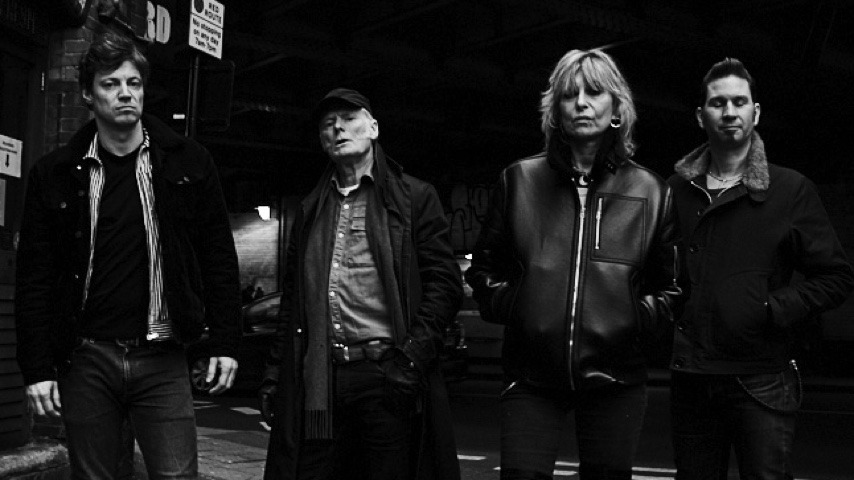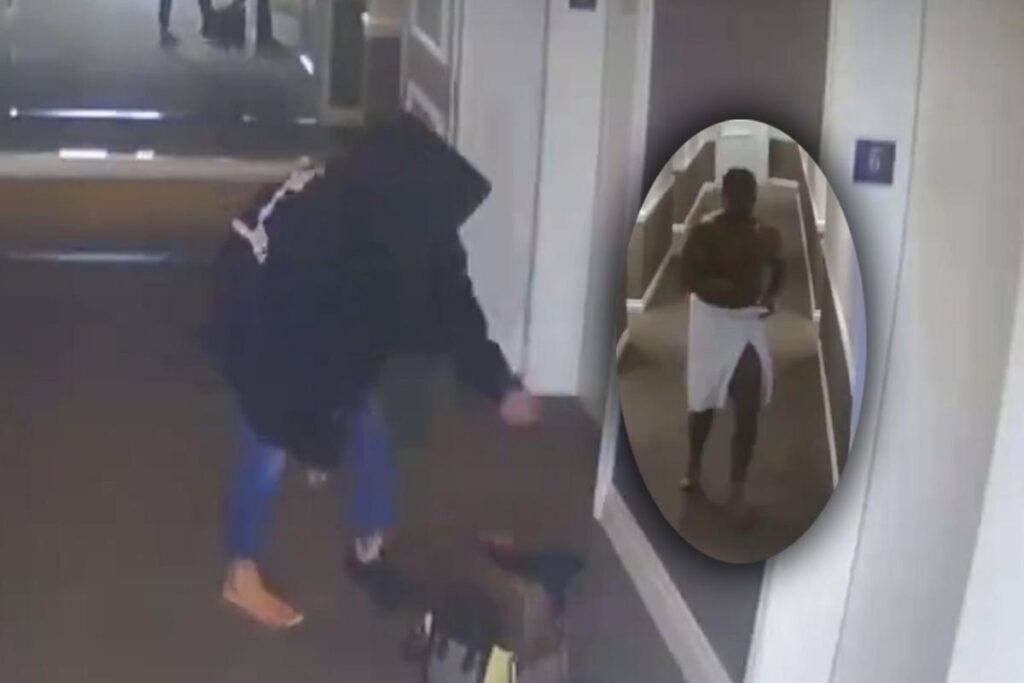Chrissie Hynde doesn’t want to talk about songwriting. The Pretenders’ lead singer and rhythm guitarist for the for 42 years has written some remarkable songs: the #1 U.K. single “Brass in Pocket,” the profane feminist anthem “Precious,” the #5 U.S. single “Back on the Chain Gang,” the Akron elegy “My City Was Gone,” the enduring Christmas classic “2000 Miles” and even the haunting ballad “You Can’t Hurt a Fool” from the band’s new album, Hate for Sale. But she doesn’t want to talk about how the songs were made.
“You’re asking to come behind the scenes,” she says over the phone from her home in London, “and I’d do that if I were the kind of person who’s comfortable inviting people to soundcheck. You’re saying, ‘I can see what you look like with your clothes on; can I see you naked?’ I feel like I’m giving people a finished product, and I don’t have to give them more. What’s going on backstage the rest of the time, that’s not what I’m offering. That’s why I don’t share demos.”
She’s reluctant to intellectualize what she does. “I’m in a rock band,” she adds. “I’m blagging it, as the English say, fooling them all. I’m a rock musician. I didn’t do good in school; I didn’t take lessons. I just make it up as I go along. I prefer it that way.”
But Hynde can’t maintain the anti-intellectual pose for long. When asked what makes a song successful, she cites Willie Nelson’s “Always on My Mind.” The narrator of the song has been “a shit,” she says, a failure at relationships, but you can tell he genuinely loves the person he’s singing to. And you can’t tell if that person is his ex-wife, his current wife, his mother or his daughter.
“You know a song is a success,” Hynde says, “when it can be applied to different situations like that. It enhances the experience. It’s like reading a novel, and you suddenly go, ‘God, I know exactly how that feels, but I’ve never known how to express it.’ I just read Anne Bronte’s The Tenant of Wildfell Hall, and I felt the same way. The language was beyond beautiful. Music does the same thing, but it has the advantage of being concise.”
Anyone who can segue from Willie Nelson to Anne Bronte is a lot smarter than she’s letting on. So is someone whose 2019 solo album, Valve Bone Woe, was a chamber-pop collection of songs originally done by Frank Sinatra, the Beach Boys, Charles Mingus, João Gilberto, John Coltrane and her former paramour Ray Davies, all swaddled in strings and horns. Rather than go to a party, Hynde says she’d much rather stay home and work on her painting.
Hate for Sale, may be a straight-ahead rock ’n’ roll album, that familiar Pretenders’ blend of punk-rock and classic British Invasion rock, but it’s also a bundle of very smart songs. It’s the first studio recording of her current road band: guitarist James Walbourne, bassist Nick Wilkinson and founding Pretender Martin Chambers.
“For this album, we wanted to have riffs,” she says, “and we wanted to have short songs. We wanted songs for radio, though it’s not clear if that matters anymore. When I think of radio, I think of a juice bar in Sao Paulo or a fun fair in Lima, Peru, an everyman setting, a universal, ageless place where anyone and everyone might hear the song.”
The title track stumbles on a false start, but Chambers clicks his drumsticks and the quartet comes charging out of the gate, chased by Hynde’s harmonica. The central riff is a descending chord pattern, and Walbourne fills between the vocals with short single-note bursts.
“If you like rock ’n’ roll,” Hynde says, “this is what you like: two guitars, bass and drums. It’s not the only thing I like, but it’s what I’m best known for. I’m happy to wave that flag, because people say they’re glad that I’m still out there doing it. I’m not unique, so if I like this sound, other people are going to like it too. I come from the ’60s, and then I could name 45 bands right off the bat that each had its own distinctive sound. I can’t do that now.”
Hynde pauses to consider. “I’m not trying to preserve a brand,” she says defensively. But then she thinks about it again and admits, “I guess I am, but I like the brand; I like the sound of the Pretenders; It’s the sound of Jimmy Honeyman-Scott playing the guitar. I love that sound—and so has every guitarist I’ve hired since Jimmy died.”
The latest in that parade of guitar-slingers is Walbourne, who co-wrote all 10 of the songs on the new album with Hynde. The results are so impressive that the question arises: Why hadn’t they tried it before? In fact, why did it take Hynde 15 years to go into the studio with this terrific band?
She shrugs off the questions. There were scheduling conflicts, she says, and side projects she wanted to do. During those 15 years, she made two solo albums (2014’s Stockholm and 2019’s Valve Bone Woe) and one with the short-lived group JP, Chrissie and the Fairground Boys (2010’s Fidelity). There were also two albums credited to the Pretenders, but 2008’s Break Up the Concrete featured Walbourne and Wilkinson but not Chambers, while 2016’s Alone was produced by the Black Keys’ Dan Auerbach in Nashville with no help from the road band.
There’s a thematic undercurrent to Hate for Sale: the paradox that the same thing that thrills you can also kill you—or at least do serious damage. Whether that thing is drugs, alcohol, lust, love or a career, it’s hard to distinguish the pleasure from the danger, especially when first lured into an obsession’s gravitational pull.
This is most clearly articulated on the second song, “The Buzz.” Over a classic Pretenders riff that’s melodic and rhythmic at the same time, Hynde describes romantic love as “a drug like any other, opiated, sugarcoated.” Following Walbourne’s short but chiming guitar break, she sings, “You think that you don’t care, and you think that it’s your choice. But you’re hypnotized and follow the puppet master’s voice.”
“A buzz—whether it’s love or a drug—becomes a disorder when it starts to interfere with everyday life,” she explains, “when it disrupts your lifestyle. That’s a very common theme in life and in music—that’s almost all of music, in fact. When Otis Redding sings, ‘I’ve Been Loving You Too Long,’ you can’t tell if he’s singing about a love affair or a drug addiction. They can be the same, where the first thing in the morning all you can think about is when are you going to see your lover, when are you going to get your heroin.”
Several songs detail the danger of such obsessions. “Lightning Man,” set to a lazy reggae-dub groove and spiced by Walbourne’s surf guitar, mourns a gifted musician who succumbed. “Demons got the better of you,” Hynde laments; “that’s what demons do.” The clue to the song’s inspiration is right there in the lyric: “You’re just too Swift in name and soul and spirit.” Richard Swift, the Nashville guitarist on the Alone album, died of alcoholism during the writing sessions for Hate for Sale.
Another chapter in the same story is the stuttering, push-and-pull rock ’n’ roll of “Junkie Walk,” the tell-tale posture of an addict on the sidewalk looking to score, waiting to die. “Turf Accountant Daddy,” named after the English slang for a bookie, warns of the kind of outlaw lover who’s never going to stay put for long.
A more hopeful song is “You Can’t Hurt a Fool,” a gorgeous ballad out of the Memphis Soul school with a clipped guitar riff borrowed from James & Bobby Purify’s “I’m Your Puppet.” In the lyrics, Hynde describes a woman who has been a fool, breaking the rules, “slipping and tripping, coming undone.” But she emerges from each disaster—unfaithful men, unforgiving drugs—as an intact survivor. “If you said she was damaged,” Hynde sings, “I wouldn’t believe you.” As if looking into a mirror, the 68-year-old Hynde adds that this woman is “too old to know better, too young for her age.”
Of course, this isn’t the first time Hynde has ventured into soul-music territory. In 1984, she released a remake of the Persuaders’ 1972 hit “Thin Line Between Love and Hate” as a Pretenders’ single. In 1988, the Pretenders contributed a version of Dionne Warwick’s 1967 hit “Windows of the World” as the only newly recorded song for the soundtrack of the movie 1969. This was the kind of music the teenage Hynde listened to in Akron, along with her favorite rock ’n’ roll bands such as the Kinks and the Beatles.
“If you like a certain kind of music when you’re young,” Hynde claims, “it means the same to you all your life. The kind of song you like when you’re 14, you’ll like when you’re 70. It’s timeless. That’s true of any art form. To me, R&B is Joe Tex, not what they call R&B now. It had a stripped-down backing; it never sounded synthetic, and the singer was the main thing. To me, Lou Rawls’ ‘Love Is a Hurtin’ Thing’ is the perfect single. I loved the rhythm guitar on those songs. That’s what I wanted to do: play the same figure through the whole song and have the whole song built on that.”
The other big ballad on the new album is the album-closer, “Crying in Public.” Producer Stephen Street wanted to do it with the Duke Quartet, which had backed Hynde on the entire 1995 live album, Isle of View. This time, it was just the one song, which features Hynde on vocal, Walbourne on piano and the classical string quartet.
The lyrics are a declaration of sympathy and solidarity with all the other women in the world who have also found themselves weeping on trains, on park benches, in a parked car, their tissues overwhelmed and their mascara running. Hynde sings it as if she really believes what she claimed in the earlier ballad: a woman may be a fool from time to time, but you can’t really hurt her.
“It was a treat to use the Duke Quartet again,” she notes. “James has a particular style of playing the piano that I like—he calls it music hall; I call it church piano. I must have heard three different women telling me within three months that they were overcome in public. I think that’s a woman thing; I don’t see men doing it. At least that’s my observation.”
In a normal world, the Pretenders would be on the road now, touring all over the world to support the album. But the coronavirus has turned the world upside down, and Hynde finds herself spending most of her days at home, painting and making music. She and Walbourne have already recorded an album of Bob Dylan covers via the phone. Like many folks, Hynde misses the camaraderie of her co-workers but also appreciates the gift of unexpected solitude.
“Collaborations are a blast,” she says. “I like working with people. I spend a lot of time alone, but when I’m on stage with the band, I love that I can turn around and see three other people who been doing this since their childhood, just like I have. That’s a great feeling, and it can only happen on that stage or in a recording studio. It’s a precious thing and everyone values it. People say they retire so they can pursue their hobby. We didn’t do that. We pursued our hobby and made it a career, so we can’t retire.
“It doesn’t matter if the band’s been together for a month or 15 years. If it’s working, it feels the same. What’s the difference between being married for two weeks to someone you adore and being married for 30 years to someone you adore? I only worked with Jimmy for a short while, because he died at 25, but it has influenced everything I’ve done ever since. I can go into a piano bar and hear someone playing—a man, a woman or a chimpanzee—and we might be the right combination for singing a song.”
On the other hand, the title song from her 2016 album Alone is a celebration of seclusion. Over some rollicking, piano-driven, Arkansas funk reminiscent of the Band, Hynde belts out her defiant manifesto: “No one to say, ‘You’re doing it wrong.’ I’m at my best, I’m where I belong: alone. Yeah, I like it.” She can walk anywhere she wants, watch any movie she wants, even hang out in the cemetery if she wants.
“I hear people with families saying, ‘I crave my alone time,’” Hynde says. “I don’t crave it because I have all of it I want. Living alone is the same feeling as moving out of your parents’ house when you’re 17, when you don’t have to answer to anyone else, when you can do what you want when you want. When I met Dan Auerbach, we were talking about people going out with their families. I said, ‘I do that by myself, because I have to.’ Dan said, ‘Write a song about that.’ So I did.”
Her days are full, she insists. She can lie down on the floor and sing Bob Dylan songs over the phone into Walbourne’s recording equipment. She can stand at the easel for hours. “Painting and making music aren’t that different,” she argues. “Painting is a meditation, you can walk away at any moment, but you don’t because you’re so into it. There’s this great feeling when it’s over, like stepping off stage.”
On the other hand, the new album includes a song called “Didn’t Want To Be This Lonely.” It’s a clap-along, garage-rock party song, but the lyrics are intriguingly ambivalent. On the one hand, the narrator is relieved to be rid of her no-good man, “devoid of morals or belief.” On the other hand, she admits, “I didn’t want to be this lonely.” That’s the other side of “The Buzz.” It can be destructive, sure, but you can miss it when the thrill is gone.
“Being alone is not the same as loneliness,” Hynde insists. “There’s an epidemic of loneliness. I’m conscientious to not celebrate that, because people are dying of it.” What’s difference? I ask, and she says, “If you can sit down and have a cup of tea by yourself and you’re happy with that, that’s being alone. If you can’t be happy having a cup of tea by yourself, that’s loneliness.”




